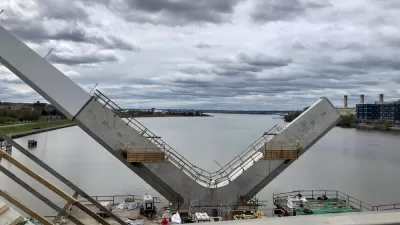This past week I had the pleasure and honor of participating in the Next American City's Urban Vanguard conference. Held in Washington DC, the event brought 35 young urban leaders together from a wide variety of backgrounds. The magazine--one of my favorites--did an outstanding job organizing and running the two-day blitz of tours, events, networking opportunities, and intimate conference sessions. In an effort to keep this brief, I have outlined three highlights from the second day of the conference.
This past week I had the pleasure and honor of participating in the Next American City's Urban Vanguard conference. Held in Washington DC, the event brought 35 young urban leaders together from a wide variety of backgrounds. The magazine--one of my favorites--did an outstanding job organizing and running the two-day blitz of tours, events, networking opportunities, and intimate conference sessions. In an effort to keep this brief, I have outlined three highlights from the second day of the conference.
Afer formally presenting our own work to fellow Vanguards, Harriet Tregoning's keynote address provided all attendees with an
opportunity to hear the latest from a smart growth luminary. From abolishing
parking minimums to expanding the city's bicycle and transit network,Tregoning energetically shared the work she is undertaking as Washington DC's Director of Planning. Attendees seemed just as impressed with her engaging presentation style as they were with the progressive moves she is making to create a better and more sustainable city--one that may serve as a model for our whole country. What is more, Tregoning arrived at the event by bicycle, which may be the
fastest way to impress this blogger. After all, not every urbanist walks the walk...
After the presentation, Tregoning fielded tough topical questions on diverse issues like removing the city's federally imposed height limit and the supposed dearth of excellent modern architecture in the city's largely historic core. Her response to the former cited the impressive amount of development the city can still absorb without building an inch higher. In answering the latter, she admitted that some better design could occur, but reasoned that DC is not exactly a 'starchitect' type of town. Both debates, as you can imagine, could not be settled in a mere afternoon.
Following the keynote, Vanguard attendees broke into three groups to exchange ideas loosely related to our areas of expertise: Public involvement, transportation, and
land use. Great discussion was generated amongst the architects, planners,
politicians, writers, policy wonks, and advocates in the room. Indeed, it's rare to have the chance to speak to so many bright people across disciplines at once, and its instructive to learn how a generally likeminded group of urbanists can see a single issue through so many different lenses.
Later that evening, the Next American City's
monthly Urban Nexus event brought DC's most well-known bloggers
together to discuss the role of blogging and its ability or inability to
spur debate, increase public involvement, and create physical and policy change. The impressive roundtable
included, amongst others, David Alpert from Greater, Greater Washington, Matthew
Yglesias of Think Progress, and Ben Adler who is a Next American City Fellow and contributor to Politico.Many individual experiences and opinions were bandied about, including thoughts on the limitations of online media and social networking. However, in the end it seemed most panelists shared personal anectodes explaining how harnessing web 2.0 technology is helping them create change, or in the least, build awareness and opportunities for civic engagement. This was noted to be especially important in the face of the shrinking print media industry that often fails to cover local "hot button" issues with any sort of regularity or journalistic acumen.
While it
is not quite clear how the Vanguard will be involved with the Next American City in
the coming year--dozens of ideas were discussed and a draft manifesto was created--it is clear that we will all work with the good folks at the magazine to help them advance the discussions surrounding the 21st century American city. And as exciting as that is, I am already looking beyond the next year with anticipation, as collaborating and following my fellow Vanguards long into the future promises to be as inspiring as it was to learn about the accomplishments that brought them to Washington DC in the first place.

Trump Administration Could Effectively End Housing Voucher Program
Federal officials are eyeing major cuts to the Section 8 program that helps millions of low-income households pay rent.

Planetizen Federal Action Tracker
A weekly monitor of how Trump’s orders and actions are impacting planners and planning in America.

The 120 Year Old Tiny Home Villages That Sheltered San Francisco’s Earthquake Refugees
More than a century ago, San Francisco mobilized to house thousands of residents displaced by the 1906 earthquake. Could their strategy offer a model for the present?

HSR Reaches Key Settlement in Northern California City
The state’s high-speed rail authority reached an agreement with Millbrae, a key city on the train’s proposed route to San Francisco.

Washington State Legislature Passes Parking Reform Bill
A bill that would limit parking requirements for new developments is headed to the governor’s desk.

Missouri Law Would Ban Protections for Housing Voucher Users
A state law seeks to overturn source-of-income discrimination bans passed by several Missouri cities.
Urban Design for Planners 1: Software Tools
This six-course series explores essential urban design concepts using open source software and equips planners with the tools they need to participate fully in the urban design process.
Planning for Universal Design
Learn the tools for implementing Universal Design in planning regulations.
Ada County Highway District
Clanton & Associates, Inc.
Jessamine County Fiscal Court
Institute for Housing and Urban Development Studies (IHS)
City of Grandview
Harvard GSD Executive Education
Toledo-Lucas County Plan Commissions
Salt Lake City
NYU Wagner Graduate School of Public Service






























